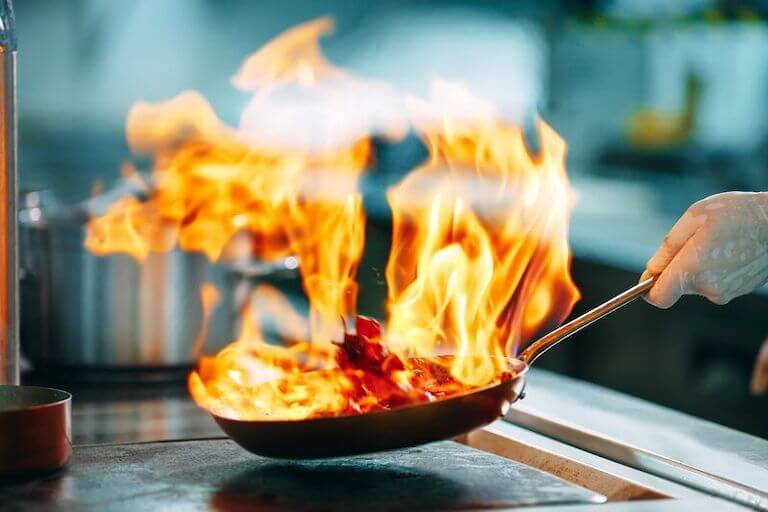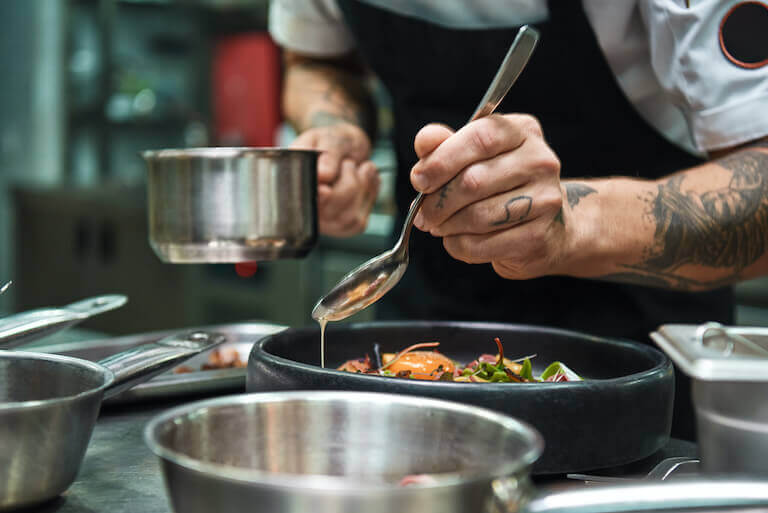Listen to This Article:
Cooking competition shows flood our screens, but occasionally, we stumble upon a buzz-worthy food episodic like the FX on Hulu series The Bear. Since season one’s drop in 2022, this show didn’t just tantalize taste buds; it grabbed hearts with its unfiltered portrayal of a chef’s life—beyond the confines of the kitchen.
The spotlight shines on the lead character of The Bear cast, Carmy Berzatto, portrayed by Jeremy Allen White. The series plunges us into Carmy’s windy journey when he’s forced to leave behind the glitz of the world’s finest restaurants to revive his late brother’s rundown joint, The Original Beef of Chicagoland.
He instantly confronts everything from a dysfunctional kitchen line and mismanagement of food orders to deep-seated financial turmoil. However, amidst the chaos, both Carmy and his kitchen crew unwittingly evolve, absorbing valuable lessons that ultimately help them to grow—both personally and professionally. For culinary students seeking insights, let’s dish out the six key takeaways from The Bear!
1. The Power of Career Development and Upskilling
Carmy deals with daily tests of patience managing his diverse kitchen crew, but he believes in something crucial: a real leader invests in their team. Amidst the chaos, many of his kitchen staff grab chances to expand their cooking skills.
Upskilling is when a workplace gives extra training to fill skill gaps and help folks move up the job ladder.
So, how does this all unfold in The Bear? Sydney advances to chef de cuisine, after proving to Carmy that she can become a fearless leader in the kitchen from staging. Then, long-time cook Tina becomes Sydney’s sous chef, plus gets the opportunity to explore fundamental cooking skills at culinary school with her colleague Ebra. We witness Tina’s confidence and skills skyrocket, as she starts to contribute to the menu development process while becoming Sydney’s right-hand woman.
Later on, cousin Richie also stages at a three-star Michelin restaurant in Chicago, where he gains a deeper appreciation for the micro details, like ensuring the cutlery is spotless and always using appropriate kitchen language. He quickly finds out that these subtleties can impact guest experiences and begins to instill these findings at The Bear. Ultimately, we see that these growth opportunities help the “people” transform the heartbeat of Carmy’s restaurant.
2. Keep a Pulse on Mental Health
Through Carmy’s lens, we see numerous layers of anxiety, anger, and grief rapidly unfold, painting a raw picture of life behind the restaurant curtain. For instance, once Carmy begins to instill “new changes” at his brother’s eatery, vivid flashbacks consume his mind, reminding him of his prior jobs. At the same time, he’s forced to grapple with personal challenges, such as his brother’s unexpected death. But with his sister’s advice, he starts to attend Al-Anon meetings to address some of these mental health challenges in his free time.

The kitchen can be a stressful place, and keeping an eye on mental health can be critical to success.
We slowly see Carmy’s demeanor change as he begins to reconcile with his past, allowing him to feel freer and lighter in the kitchen. The mental health journey Carmy embarks upon can be a great lesson for all students and culinarians alike—to never neglect your own mental health needs, take necessary breaks, and always seek professional help if needed.*
3. Organization is Integral
With his extensive experience in top-notch restaurants, Carmy’s got kitchen organization down pat. He swears by the Brigade de Cuisine—coined by Auguste Escoffier himself, our school’s namesake. In simple terms, this concept outlines a kitchen hierarchy, where each cook owns a specific job, which can keep things in check at any given time.
But when Carmy steps into The Original Beef, he clocks that the legacy crew doesn’t abide by any type of organizational system. So immediately Carmy sets up the kitchen brigade system, dishing out specific roles to everyone. Sure, there’s pushback at first, but gradually, the crew eases into their new roles. Respect starts to ensue, and teamwork kicks in.
The takeaway? Well, there’s a few! First off, people can get stuck in their old ways, and it may take some time for them to adopt new systems, which is okay! It just takes a little patience. Secondly, employing a solid organizational system can work wonders, which can mitigate the chaos and make the workplace a whole lot better for everyone!
4. Empathy Can Build a Strong Team Culture
At the end of the day, we’re all human, and sometimes the line between personal and professional lives can blur. When you find yourself working in a hospitality spot or a restaurant that gets this and leads with empathy and understanding, you may also witness an unbreakable team culture. Employees need a safe space to make mistakes!
Take Marcus in The Bear, for instance. He got sidetracked by a passion project, slacked on his cake-baking duties, and ended up in a mixer meltdown that killed the restaurant’s power. Carmy quickly consoled him, communicating that working in a restaurant can feel like a rollercoaster, mistakes happen, and that’s A-okay. The key? Keep your focus as best as you can. For students who may aspire to become executive chefs down the line, it’s crucial to express empathy, which can cultivate a safe workspace. Ultimately, this can act as the “glue” for building a rock-solid team culture.
5. Whatever Grows Together, Goes Together
When Carmy opens the doors to The Bear, he makes it clear that he’s committed to sourcing produce from the local farmer’s market, with a mission to change the menu daily. Tina, tasked with purchasing, soon discovers from her supplier that fewer farmers means fewer vegetables. Yet, the supplier provides Tina with sage advice: “whatever grows together, goes together.” This quickly becomes Tina’s guiding principle. Instead of seeing the limited selection as a setback, Tina begins to ideate new dishes inspired by the vegetables in season, discovering the magic that happens when these ingredients are paired together.

While limited produce can be a challenge, seasonal vegetables can elevate your dishes and menu!
Culinary students at Escoffier can dive even deeper into this concept in our Farm to Table courses where they can explore how to cultivate professional relationships with local farmers and ranchers. Like Tina in The Bear, students can learn about menu production and crafting sustainable dishes from thoughtfully selected, organic ingredients.
6. Find Your List of “Non-Negotiables”
Once The Bear is officially launched, we see a shift in Carmy’s mindset—he’s ready to reach a new level of greatness. To raise the bar for himself and his team, he establishes a new set of standards called “non-negotiables.” These include: perfectly pressed shirts, strict personal hygiene, changing the menu daily, respecting tradition, pushing boundaries, fostering vibrant collaboration, maintaining focus, and more.
Carmy dedicates significant time to refining these standards, even going the extra mile to have them printed for his team. While it may seem extreme, Carmy knows from his experience in Michelin-starred kitchens that this kind of discipline fosters daily accountability. As his team begins to embrace these standards, we see kitchen operations and service begin to streamline, quickly catching the attention of diners and restaurant critics.
It’s important to note that creating non-negotiables isn’t just beneficial for restaurants; culinary students can also create their personal list to strive for excellence. Key areas might include time management, organization, mise en place, and respect for ingredients. Crafting a set of non-negotiables not only reflects your values in the kitchen but can make a strong impression on future employers, partners, and colleagues.
Navigating Essential Insights from The Bear
The key lessons drawn from the cast of The Bear and specifically Carmy’s journey can offer invaluable insights for culinary students! From embracing career development and prioritizing mental health to leading with humility and structure can not only sculpt culinary expertise but also cultivate a resilient culinary community.
If you’re thinking about expanding your culinary skill set, or aspire to operate your own business one day, just like Carmy, contact us to take the next step in your journey!
LOOKING TO INDULGE IN MORE ARTICLES? TRY THESE NEXT!
- How Culinary School Students Can Foster a Sense of Belonging
- Learning How to Cook: A Guide for Beginners
- 6 Benefits of Studying at a Top Culinary Institute
*Information may not reflect every student’s experience. Results and outcomes may be based on several factors, such as geographical region or previous experience

